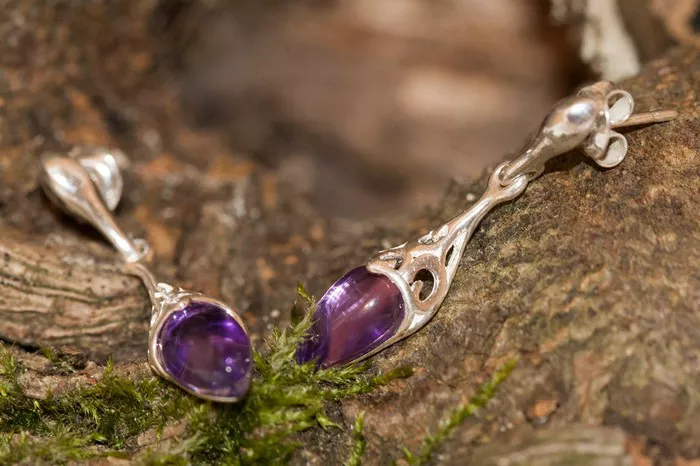Maintaining an amethyst necklace is crucial to preserving its beauty and value over time. As a jewelry appraiser, I understand the importance of proper care and maintenance for all types of jewelry, especially for precious gemstones like amethyst. This guide will provide you with a comprehensive understanding of how to care for your amethyst necklace, ensuring it retains its vibrant color and stunning appearance.
Understanding Amethyst
Amethyst is a variety of quartz that exhibits a beautiful purple hue, ranging from light lavender to deep violet. This gemstone has been valued for thousands of years for its mystical properties and stunning appearance. Amethyst is relatively hard, with a Mohs hardness of 7, making it suitable for jewelry creation. However, despite its hardness, amethyst can still be damaged if not handled and maintained properly.
Regular Cleaning
Importance of Cleaning
Regular cleaning is essential to remove dust, dirt, and grime that can accumulate on the surface of the amethyst and the metal settings. Over time, these impurities can dull the gemstone’s shine and even cause permanent damage.
Cleaning Methods
Gentle Cleaners: Use a mild, gemstone-safe cleaner or a mixture of warm water and a few drops of neutral soap. Avoid using harsh chemicals, abrasives, or acidic cleaners, as they can damage the amethyst.
Soft Cloths: Use a soft cloth, such as a microfiber cloth, to gently wipe the surface of the amethyst and the metal settings. Avoid using abrasive materials or scrubbing too hard, which can scratch the gemstone.
Soaking: If the necklace is heavily soiled, you can soak it in the cleaning solution for a few minutes before gently wiping it clean. Ensure that the solution does not contain any harsh chemicals that could harm the amethyst.
Rinsing and Drying: After cleaning, rinse the necklace thoroughly under running water to remove any soap residue. Pat it dry with a soft cloth, avoiding excessive rubbing.
Avoiding Harmful Substances
Chemicals
Amethyst is sensitive to certain chemicals, such as bleach, ammonia, and harsh detergents. Exposure to these substances can cause discoloration, etching, or even cracking of the gemstone. Therefore, it’s important to remove your amethyst necklace before engaging in activities that may expose it to these chemicals, such as cleaning, swimming, or using harsh chemicals.
Cosmetics and Perfumes
Similarly, cosmetics and perfumes contain chemicals that can damage amethyst. Apply these products before putting on your necklace to avoid direct contact. If you must apply them after wearing the necklace, ensure that you do so carefully and avoid getting them on the gemstone.
Protecting from Physical Damage
Avoiding Collisions
Amethyst, while hard, is still brittle and can shatter if dropped or hit with sufficient force. Therefore, it’s important to handle your amethyst necklace with care, avoiding rough handling or dropping it. Store it in a soft cloth or jewelry box lined with fabric to prevent it from coming into contact with other hard objects.
Preventing Scratches
Scratches can dull the surface of amethyst, reducing its shine and value. To prevent scratches, avoid wearing your amethyst necklace when engaging in activities that may expose it to abrasive surfaces, such as gardening or construction work. Additionally, store it separately from other jewelry to avoid scratches from metal settings or other gemstones.
Temperature and Humidity Control
Avoiding High Temperatures
High temperatures can cause amethyst to lose its color and become dull over time. Therefore, avoid exposing your amethyst necklace to direct sunlight, heat sources, or high-temperature environments, such as saunas or steam rooms.
Humidity Management
Amethyst is sensitive to changes in humidity, which can cause it to crack or lose its luster. To maintain optimal humidity levels, store your amethyst necklace in a cool, dry place. Avoid storing it in damp or humid environments, such as bathrooms or basements.
Proper Storage
Storage Solutions
When not wearing your amethyst necklace, store it in a fabric-lined jewelry box or pouch to protect it from scratches and dust. If possible, use a jewelry organizer with individual compartments to keep each piece separate and secure.
Avoiding Air Exposure
Long-term exposure to air can cause amethyst to lose moisture and become brittle. To prevent this, store your necklace in an airtight container or wrap it in a soft cloth when not in use.
Professional Maintenance
When to Seek Professional Help
While regular home maintenance is essential, there are times when professional help is necessary. If your amethyst necklace becomes heavily soiled or damaged, consider taking it to a professional jeweler for cleaning and repair. They have the tools and expertise to restore your necklace to its original condition without causing further damage.
Inspection and Maintenance
Even if your amethyst necklace looks fine, it’s a good idea to have it inspected by a professional jeweler at least once a year. They can check for any signs of wear, damage, or loose settings and make necessary repairs or adjustments.
Additional Tips
Inspecting Regularly
Regularly inspect your amethyst necklace for signs of wear, such as scratches, chips, or loose settings. Address any issues promptly to prevent further damage.
Handling with Care
Always handle your amethyst necklace with care, avoiding sudden movements or rough handling that could cause it to fall or be damaged.
Removing Before Bed
To prevent damage and keep your amethyst necklace looking its best, remove it before going to bed. This will prevent it from being tangled in bedsheets or scratched by other jewelry.
Conclusion
Maintaining an amethyst necklace requires a combination of regular cleaning, avoiding harmful substances, protecting from physical damage, controlling temperature and humidity, and proper storage. By following these guidelines, you can ensure that your amethyst necklace retains its vibrant color, shine, and value for many years to come. Remember, the key to successful maintenance is consistency and care. Treat your amethyst necklace with the respect and attention it deserves, and it will reward you with years of beauty and enjoyment.
Related topic:
- Can You Put Amethyst in Salt Water?
- How to Tell if Amethyst Cluster Is Real
- How to Obtain an Amethyst Shard?


